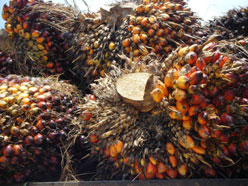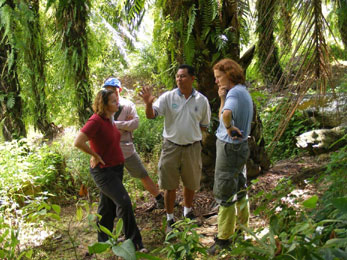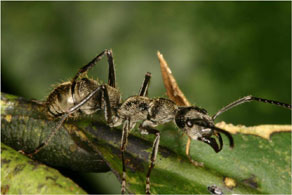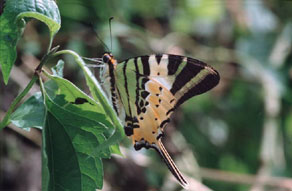Balancing the effects of palm oil production
Posted on 13 January 2010

Palm oil is a versatile, relatively cheap product used across the world in processed foods, soaps and cosmetics, and as a fuel in biodiesel.
While the production of this useful oil is crucial to local economies, in some parts of South East Asia large areas of tropical rainforest have been felled to make way for oil palm plantations.
A team of scientists, led by University of York biologist Dr Jane Hill and including staff from the Environment Department, has obtained funding from the UK Government Darwin Initiative to research ways of reducing biodiversity losses relating to palm oil production.
Funded for three years, the project involves a collaboration of researchers in the UK and Malaysia and includes training scientists to continue this work in the future.
The Darwin Initiative, introduced after the Rio Earth Summit in 1992, assists countries that are rich in biodiversity but poor in financial resources to meet their obligations under a range of international environmental conventions.

“True to the ethos of the Darwin Initiative, our project aims to balance the economic gains of palm oil production with halting biodiversity losses,” says Dr Hill.
“One potential strategy is to have patches of rainforest within agricultural areas. These ‘corridors of life’ may help species survive in degraded habitats and could provide ‘stepping stones’ across an area.
“Our research is important because, as yet, there is no information to show whether these strategies will be effective.”
The team has begun by focussing on ants and will later study the patterns of butterflies. Both species are highly diverse, and are sensitive indicators of environmental changes.
In discussions with local plantation managers, Dr Hill’s team has found that while many wish to grow oil palm sustainably, it is not clear how to achieve this so guidance on the benefits of reforestation may be needed.

Some plantation managers feel that maintaining rainforest fragments within agricultural areas is not effective and may even be detrimental if forests harbour harmful pests. But Dr Hill suggests that fragments may support natural predators of destructive insects, and may have other beneficial effects. For example, ants are important predators, and ant colonies may also improve the quality of soil and assist in seed dispersal.
The Roundtable for Sustainable Palm Oil (RSPO) promotes the growth and use of sustainable palm oil and aims to bring together all those involved in the palm oil supply chain to discuss and cooperate in achieving this common goal. For a product to be labelled ‘RSPO approved palm oil’ plantation managers must adhere to certain standards.

Presently, the premium on RSPO-branded palm oil is not sufficient to warrant the costs involved. But, as retailers demand more ethical ingredients for their products, the premium for RSPO palm oil may increase and make it worthwhile for local producers.
Findings from the Darwin Initiative project will provide future guidelines on best-practice in retaining forest remnants within oil palm plantations. If, as Dr Hill hopes, these remnants are found to be sources of beneficial insects - such as predators of agricultural pests - this would suggest that rainforest fragments may not only promote biodiversity but can also improve agricultural productivity.
About the researcher

Dr Jane Hill is a researcher in the Department of Biology
Contact
Email: jkh6@york.ac.uk
bioltfws1.york.ac.uk/biostaff/staffdetail.php?id=jkh
Further information
- More information on the Darwin Initiative can be found at (http://darwin.defra.gov.uk/)
- More information on RSPO can be found at www.rspo.org
- Other institutions involved in the research are:
- Centre for Biodiversity and Conservation, School of Biology, University of Leeds, Leeds, LS2 9JT
- Department of Sustainable Agriculture, Universiti Malaysia Sabah
- Institute of Tropical Biology & Conservation, Universiti Malaysia Sabah
- Forest Research Centre, Sabah Forestry Department, PO Box 1407, 90715 Sandakan, Sabah, Malaysia
- Malaysian Palm Oil Board (MPOB), Bandar Baru Bangi, 43000 Kajang, Selangor, Malaysia
- PPB Oil Palm Bhd., Sandakan 90009, Sabah
- Royal Society SE Asian Rainforest Research Programme, Danum Valley, Sabah
- Study in the Department of Biology
